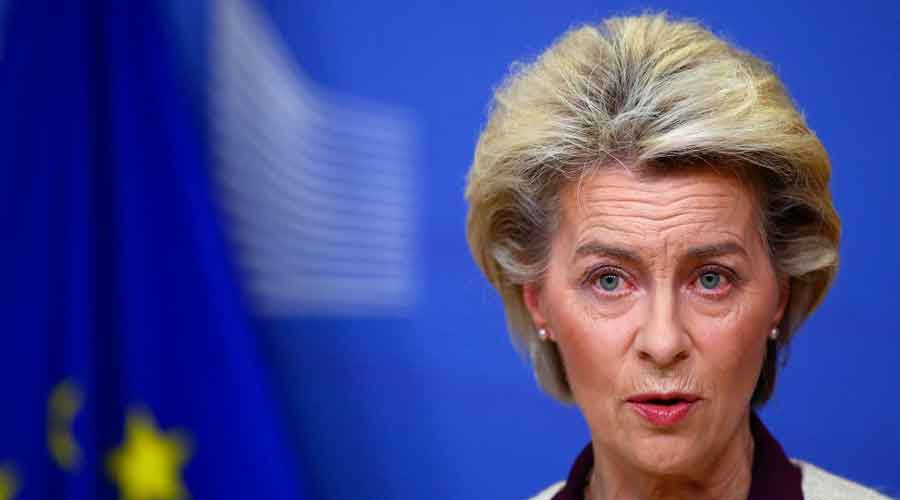European Commission chief Ursula von der Leyen said on Sunday the world was in a "race against time" to understand the new Covid variant, calling for precautions to give scientists time to analyse the Omicron strain.
“We know that we are now in a race against time,” said von der Leyen during a visit to Riga, adding that vaccine manufacturers need two to three weeks “to get a full picture of the quality mutations “.
Indonesia announced similar entry restrictions on Sunday and Angola became the first southern African country to suspend all flights from its regional neighbours Mozambique, Namibia and South Africa.
Dubbed Omicron, the strain has cast doubt on global efforts to battle the pandemic because of fears that it is highly infectious, forcing countries to reimpose measures many had hoped were a thing of the past.
"We know we are now in a race against time," European Commission chief Ursula von der Leyen said, adding that vaccine manufacturers needed two to three weeks "to get a full picture of the quality of the mutations".
Dutch health authorities said they had identified at least 13 cases of Omicron among 61 quarantined passengers who tested positive for coronavirus after arriving from South Africa.
"The investigation has not yet been completed. The new variant may be found in more test samples," the National Institute for Public Health warned.
Despite the alarm, in Austria tens of thousands rallied to protest against the government's introduction of compulsory vaccination -- the first EU country to do so.
Chancellor Alexander Schallenberg said it was "a minor interference" compared to the alternative for a country with one of the lowest vaccination rates in Western Europe.
With many European nations, including Germany and France, already bringing back curbs to counter surges in infections, Swiss voters firmly backed a proposed Covid pass law in a referendum on Sunday.
In Britain, Health Secretary Avid Javid said new Covid rules will be enforced from Tuesday.
Mask-wearing will again be mandatory in shops and on public transport in England. And all arriving passengers will have to take a PCR test and self-isolate until negative.
As scientists race to determine the level of threat posed by the new strain -- particularly whether it can evade existing vaccines -- a South African doctor said dozens of her patients suspected of Omicron infection had only shown mild symptoms such as fatigue.
Angelique Coetzee, chair of the South African Medical Association, who alerted health officials to a "clinical picture that doesn't fit Delta", told AFP she had seen 30 patients over the past 10 days who tested positive for Covid-19.
They had fully recovered without hospitalisation. Coetzee said it was unfortunate that Omicron had been hyped as "this extremely dangerous virus variant" when its virulency was still unknown.
A long list of countries have already imposed travel restrictions on southern Africa, where it was first detected, including key travel hub Qatar, the United States, Britain, Saudi Arabia, Kuwait and the Netherlands.
Indonesia announced similar entry restrictions on Sunday and Angola became the first southern African country to suspend all flights from its regional neighbours Mozambique, Namibia and South Africa.
Morocco said it was halting incoming flights for two weeks from Monday.
'Very dangerous'
Israel announced some of the strictest curbs, closing the borders to all foreigners -- just four weeks after reopening to tourists following a prolonged closure due to Covid.
"We are raising a red flag," Israeli Prime Minister Naftali Bennett said. Ten million PCR test kits would be ordered to stem the "very dangerous" strain.
Israeli citizens will be required to present a negative PCR test and quarantine for three days if they have been vaccinated against the virus and seven days if they have not.
But the new strain has already slipped through the net, and has now been found everywhere from the Netherlands to the UK, Hong Kong to Australia, where authorities Sunday said they had detected it for the first time in two passengers from southern Africa who were tested after flying into Sydney.
Omicron's emergence comes just a month after Australia lifted a ban on travelling overseas without permission.
Denmark confirmed its first Omicron infections, in two passengers who arrived on a flight from South Africa and Germany added a third case.
Blame game
The speed at which governments slammed their borders shut took many by surprise, with travellers thronging Johannesburg international airport, desperate to catch the last flights to countries that are imposing sudden travel bans.
Scientists in South Africa said they had last week detected the new B.1.1.529 variant with at least 10 mutations, compared with three for Beta or two for Delta -- the strain that hit the global recovery hard and sent millions worldwide back into lockdown.
The variant has also revived geopolitical fault lines exacerbated by the pandemic, with the US quick to hail South Africa's openness -- a thinly veiled jab at China's handling of information about the original outbreak.
US Secretary of State Antony Blinken on Saturday "praised ... South Africa's government for its transparency in sharing this information, which should serve as a model for the world".











